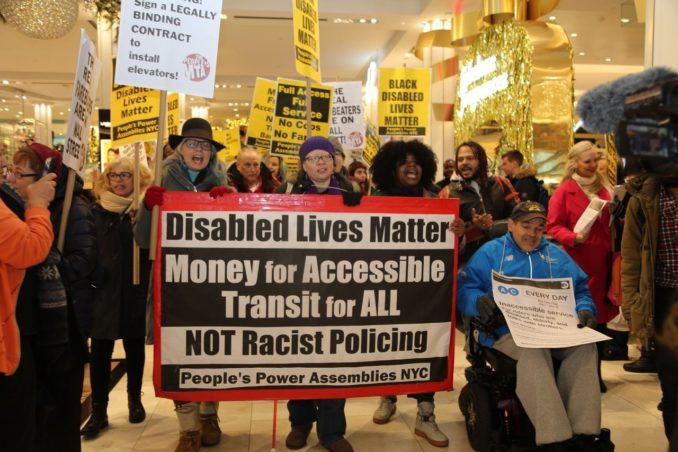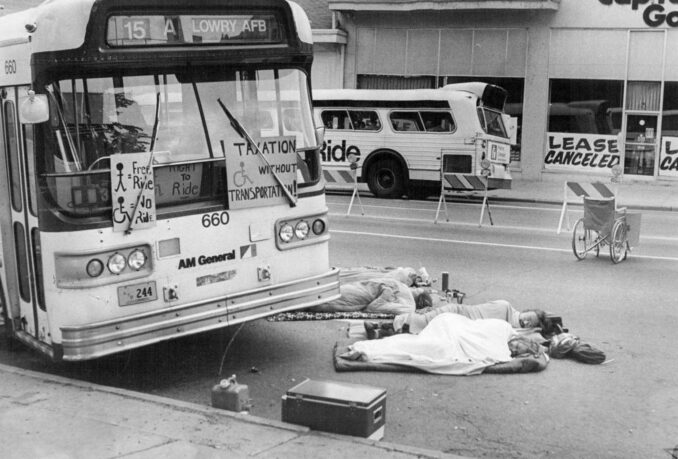

Demonstration inside Macy’s in New York City, on the International Day for Persons with Disabilities in 2019. WW Photo
The following remarks were delivered during a webinar hosted by the Peoples Power Assemblies–NYC on Dec. 3 in observence of the International Day for Persons with Disabilities.
Welcome to our webinar on disability rights — or the lack of them. December 3 is the day the U.N. declared International Day for Persons with Disabilities. The disability rights movement is about living a full life, actively participating in all spheres of society — getting an education, working, having a family and other social connections.


Disabled activists blocked non-accessible buses in Denver in 1978.
The movement has a two-pronged strategy. One is the legal route, which led to passage of the Americans with Disabilities Act in the U.S. in 1990. The other strategy is direct action, which began in 1978 when members of ADAPT [formerly Americans Disabled for Accessible Public Transit] sat down — literally got out of their wheelchairs and down on the ground — in front of buses in Denver. ADAPT has continued with sit-ins whenever needed, including in June 2017 in Senate Majority Leader Mitch McConnell’s office to support the Affordable Care Act (Obamacare), which was threatened — and still is.
Growing concerns
As the disability rights movement has grown, so have our concerns.
First and foremost is racist policing. Black disabled lives matter. Over 50% of people of color killed by police are disabled. Some have neuro-divergent illnesses that are invisible and may lead to unpredictable behaviors, which the racist police use as an excuse to shoot them.
The case of Eleanor Bumpurs was highly publicized in 1984. Ms. Bumpurs was a 66-year-old African American woman, described as “mentally ill,” who was being evicted from her apartment in the Bronx, because she was four months behind in her rent. She told the marshals evicting her that she would pour boiling water on them if they approached her. So the police who were backing up the marshals shot her. That was 1984 — before there were cell phone cameras documenting these events. Who knows how often this sort of incident had occurred? Now, with cameras documenting incidents, we know how frequently they happen.
Another crisis we are facing is the coronavirus pandemic. The Centers for Disease Control and Prevention says that people are at higher risk of severe illness from COVID-19 if they have serious underlying chronic medical conditions, such as a chronic lung disease, serious heart condition or weakened immune system.
Adults with disabilities are three times more likely than adults without disabilities to have these conditions. And if you are in a nursing home, as many disabled people are, you are in a confined space that has shown to be a petri dish for the transmittal of COVID-19.
If we consider aging to be a disability, as the ADA does, then the number of people with disabilities who live in nursing homes grows even larger. I was heartened to hear yesterday that nursing home residents are slated to be in the first tier of recipients of the COVID vaccine.
Another battle we have to fight is the pauperization of people with disabilities. That arises because disability benefits are tied to income. If you make more than the guidelines require, you do not qualify for the benefits you may need, like help with laundry or cleaning. By federal law, people with disabilities can be paid below minimum wage, but the benefits limit makes fighting for the minimum wage problematic. This is a battle the National Federation for the Blind has been fighting for years.
Housing is another difficulty. Here the problem is accessibility. If you have limited mobility, you need an accessible entrance — not stairs!
Growing fight back
Demonstration inside Macy’s in New York City, on the International Day for Persons with Disabilities in 2019. WW Photo
The list goes on, but there has been fight back and growing understanding of these situations. And the fight back is strong and getting stronger. There is an annual parade in New York City, as well as in other cities, to celebrate the passage of the Americans with Disabilities Act. Prior to the COVID shutdown, the NYC parade drew over 15,000 people. Disabled in Action has brought lawsuits against the NYC Metropolitan Transit Authority to put elevators in all subway stations. These challenges are winding their way through the court system.
In 2006, in recognition of the worldwide struggle for disability rights, the U.N. established the Convention on the Rights of Persons with Disabilities.
So far 177 countries have ratified it — but not the U.S. (Nor has the U.S. ratified human rights treaties defending women, children and migrant workers.) The U.N. convention is much more liberal in granting disability benefits. In fact, the treaty affirms the rights of all people with disabilities to live in their community and have the necessary support to do so.
The Peoples Power Assemblies – NYC, long active in this struggle, looks forward to next year, when we will be vaccinated and can engage in more struggle to bring about necessary changes.
The following statement was posted on the English version of Al-Akhbar, based in Beirut, Lebanon,…
The following is a statement from the Popular Front for the Liberation of Palestine, Head…
The following comes from statements on Resistance News Network and Al-Akhbar English issued on May…
By Ché Marino The recent India-Pakistan conflict of May 2025 has profoundly reshaped global perceptions…
New York, N.Y. On May 18, Locomotive Engineers at New Jersey Transit (NJT) won a…
By Chris Fry This article was published first by Fighting Words on May 15. May…